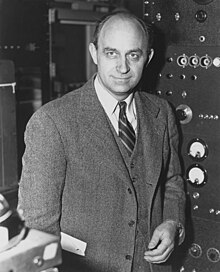Enrico Fermi
| Enrico Fermi | |
|---|---|

Enrico Fermi (1901–1954)
|
|
| Born |
29 September 1901 Rome, Italy |
| Died | 28 November 1954 (aged 53) Chicago, Illinois, United States |
| Citizenship | Italy (1901–54) United States (1944–54) |
| Fields | Physics |
| Institutions | |
| Alma mater | Scuola Normale Superiore |
| Doctoral advisor | Luigi Puccianti |
| Other academic advisors | |
| Doctoral students | |
| Other notable students | |
| Known for |
|
| Notable awards |
|
| Spouse | Laura Capon Fermi |
| Signature | |
Enrico Fermi (Italian: [enˈriːko ˈfermi]; 29 September 1901 – 28 November 1954) was an Italian physicist, who created the world's first nuclear reactor, the Chicago Pile-1. He has been called the "architect of the nuclear age" and the "architect of the atomic bomb". He was one of the few physicists to excel both theoretically and experimentally. Fermi held several patents related to the use of nuclear power, and was awarded the 1938 Nobel Prize in Physics for his work on induced radioactivity by neutron bombardment and the discovery of transuranic elements. He made significant contributions to the development of quantum theory, nuclear and particle physics, and statistical mechanics.
Fermi's first major contribution was to statistical mechanics. After Wolfgang Pauli announced his exclusion principle in 1925, Fermi followed with a paper in which he applied the principle to an ideal gas, employing a statistical formulation now known as Fermi–Dirac statistics. Today, particles that obey the exclusion principle are called "fermions". Later Pauli postulated the existence of an uncharged invisible particle emitted along with an electron during beta decay, to satisfy the law of conservation of energy. Fermi took up this idea, developing a model that incorporated the postulated particle, which he named the "neutrino". His theory, later referred to as Fermi's interaction and still later as weak interaction, described one of the four fundamental forces of nature. Through experiments inducing radioactivity with recently discovered neutrons, Fermi discovered that slow neutrons were more easily captured than fast ones, and developed the Fermi age equation to describe this. After bombarding thorium and uranium with slow neutrons, he concluded that he had created new elements; although he was awarded the Nobel Prize for this discovery, the new elements were subsequently revealed to be fission products.
...
Wikipedia

